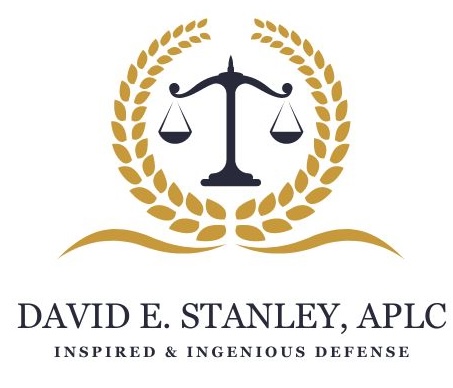Federal Criminal Defense David E. Stanley, APLC
Table of Contents
Toggle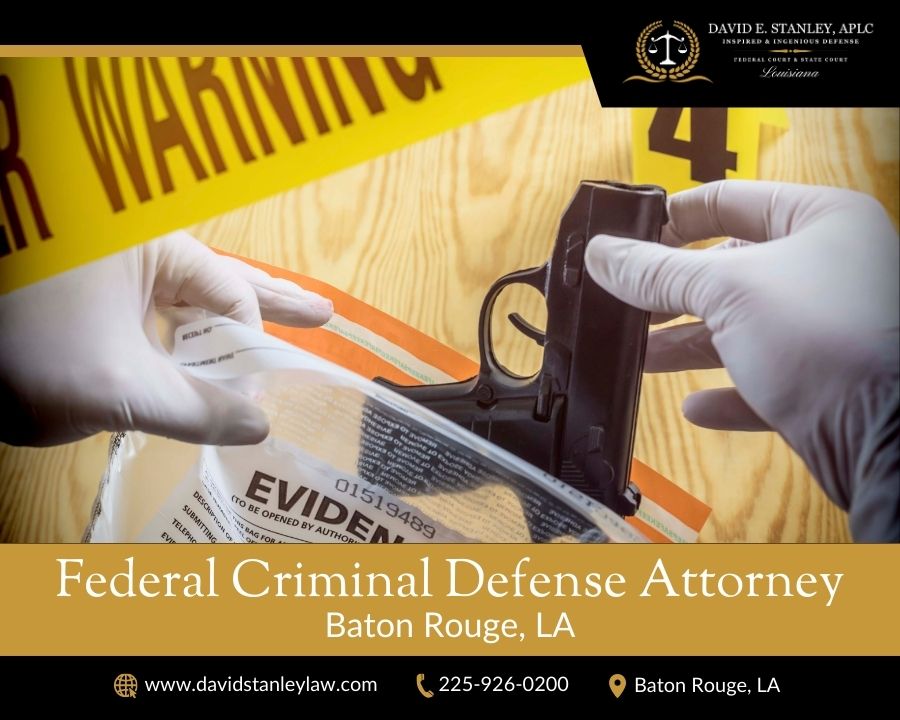
Who Investigates Federal Crimes?
There are a number of different federal law enforcement agencies that investigate federal criminal violations. These include the Federal Bureau of Investigation (FBI), the Drug Enforcement Administration (DEA), Bureau of Alcohol, Tobacco, Firearms, and Explosives (ATF), United States Secret Service, United States Postal Inspection Service, Internal Revenue Service Criminal Investigations, Customs and Border Protection, United States Coast Guard, and the United States Immigration and Customs Enforcement, the United States Marshals Service and the Department of Homeland Security. Federal Criminal Defense Attorney
Have you been arrested by a federal law enforcement agency? Are you under criminal investigation by a federal law enforcement agency? Have federal law enforcement agents appeared unannounced at the door of your home or office demanding to speak with you, or demanding that you answer their questions, or demanding that you give them a voluntary statement concerning a pending federal criminal investigation? Have you been notified by the United States Attorney’s Office that you are the target of a federal grand jury investigation? If you answered yes to any of these questions, then you have an urgent and critical need to immediately consult with, and hire, a knowledgeable and experienced federal criminal trial attorney.
Also, you have the constitutional right to remain silent and a right not to incriminate yourself, which means you do not have to make any statements to law enforcement. But, not only do you need to understand these rights, you must also act on them by invoking your rights, not answering any questions, and remaining silent. You also have the right to retain counsel of your choice before you make any statements to law enforcement. If you are indigent, and can not afford to retain counsel, then the court will appoint counsel to represent you. It is critical that you invoke and exercise all of these rights, and retain counsel, before you speak to law enforcement or produce any documents to anyone. A federal criminal trial lawyer can guide you through the process, help you avoid the pitfalls, and keep you from making life altering mistakes that will adversely affect your chances for a favorable outcome in your case.
As soon as you become aware that you may be facing criminal investigation or criminal charges, here is what you should do. First, do invoke and exercise your constitutional rights to remain silent and not to incriminate yourself. Second, do invoke and exercise your right to have counsel of your choice present with you during questioning by law enforcement officers. Once you tell the officers that you want an attorney and that you are not going to answer their questions without your lawyer present, they are required to stop questioning you until your lawyer is present with you. But, you must also then stop talking and remain silent because, if you volunteer information that is not made in response to a question, then they can use whatever you say against you. Third, contact and retain a qualified federal criminal defense attorney to represent you from that point on.
Before you speak with, and retain, qualified federal criminal defense counsel, here is what you should not do. First, do not try to explain or talk your way out of being arrested or charged with a crime. Most of the time, by the time they arrive to question you, they either already have an arrest warrant for your arrest, or they are already planning to arrest you without an arrest warrant, and simply want you to confess or incriminate yourself before they arrest you. Second, do not make any voluntary statements to law enforcement agents and refuse to answer any of their questions until you have retained counsel and he is present with you. Third, do not waive any of your constitutional or statutory rights. Fourth, do not give your voluntary consent to allow them to search your home, office, or any of your personal property including, but not limited to your cell phones, computers, luggage, briefcase, backpack, or automobile without a valid search warrant. Critical, and sometimes irreversible, mistakes can be made by an unrepresented accused person very early in the process that may damage their case and reduce the chances of a more favorable outcome. Please, do not make that mistake. Federal Criminal Defense Attorney
The defense of a felony criminal case in a federal district court is very different in many important ways from defending a felony criminal case in a state district court. Federal cases often deal with criminal conduct that originates in another country, or another state, or elements of which are committed by non-residents outside of the territorial boundaries of Louisiana. Federal criminal statutes often have elements that you do not typically find in state criminal statutes such as transportation of persons or products across state lines or in interstate commerce. The rules of criminal procedure, rules of evidence, and the rules of court in federal court are very different in important ways from those applicable in state court. Further, sentencing under the Federal Sentencing Guidelines is very different from the sentencing process in state court. Because of these differences, there are some very talented and skilled criminal defense attorneys that will not accept a criminal case filed in a federal district court and who will only take on state criminal cases.
If you are determined to fight your criminal charges, and protect your good name, regardless of what it takes or the resources required to do so, David Stanley is a distinguished and well respected federal criminal defense trial attorney experienced in defending felony criminal cases in federal courts in Louisiana. Call him right now, to schedule your completely confidential and in-depth federal criminal defense strategy session. Get him started today working for you to develop a rock solid defense strategy to fight your federal criminal charges and get your life back on track. Don’t delay, use every available minute to plan and prepare for success.
Who Prosecutes Federal Criminal Offenses
There are three federal districts in Louisiana: Eastern District, Middle District, and Western District. New Orleans is in the Eastern District. Baton Rouge is in the Middle District, and Alexandria, Lafayette, Lake Charles, Monroe and Shreveport are in the Western District. Federal Criminal Defense Attorney
The United States Department of Justice is ultimately responsible for prosecuting individuals and businesses accused of violating federal criminal statutes. While the United States Attorney General is head of the United States Department of Justice, federal criminal cases are typically prosecuted at the district court level by the United States Attorney’s Office for that particular federal district
What Is Pretrial Detention?
The federal pretrial detention provisions are found in the Bail Reform Act of 1984 in 18 U.S.C. § 3142. Under the provisions of § 3142(e), after a hearing, the judicial officer shall order the detention of the defendant before trial if he finds that no condition or combination of conditions will reasonably assure the appearance of the defendant as required, the safety of any other person, and the community.
A rebuttable presumption arises that no condition or combination of conditions will reasonably assure the appearance of the defendant as required and the safety of the community if the judicial officer finds probable cause to believe that the defendant committed: (1) an offense prohibited by the Controlled Substances Act or the Controlled Substances Import and Export Act which carries a maximum term of imprisonment of ten years or more; (2) an offense during, and in relation to, any crime of violence or drug trafficking crime while using or carrying a firearm, or who, in furtherance of any such crime, possesses a firearm; (3) certain offenses involving minor victims and other offenses specified in the statute. Likewise, upon motion of the attorney for the government, or upon the judicial officer’s own motion, a hearing will be held in a case which involves a serious risk that the defendant will flee, or a serious risk that the defendant will obstruct or attempt to obstruct justice, or threaten, injure, or intimidate, or attempt to threaten, injure, or intimidate, a prospective witness or juror.
In determining whether there are conditions of release that will reasonably assure the appearance of the defendant, the safety of any other person, and the community, the judicial officer shall consider the available information concerning the nature and circumstances of the offense charged, including whether it is a crime of violence, involves the sex trafficking of children by force, fraud, or coercion, a federal crime of terrorism, involves a minor victim, or a controlled substance,
firearm, explosive, or destructive device.He must also hear evidence and consider the weight of the evidence against the defendant, and the history and characteristics of defendant such as his character, physical and mental condition, family ties, employment, financial resources, length of residence in the community, community ties, past conduct, history relating to drug or alcohol abuse, criminal history, and record concerning appearance at court proceedings. Other factors to be considered include whether, at the time of the current offense or arrest, the defendant was on probation, on parole, or on other release pending trial, sentencing, appeal, or completion of sentence for an offense under federal, state, or local law. Finally, the judicial officer will also consider the nature and seriousness of the danger to any person or the community that would be posed by the defendant’s release.
In considering the conditions of release, the judicial officer shall, on motion of the government or upon his own motion, conduct an inquiry into the source of the property offered as collateral to secure a bond and decline to accept the use as collateral, any property that, because of its source, will not reasonably assure the appearance of the defendant as required.
In defending a case in which pretrial detention of the defendant is requested by the government, defense counsel must carefully consider a number of important legal issues. Two of these issues are whether the request for pretrial detention was timely and, if so, was the pretrial hearing held timely. Defense counsel must also be prepared to present evidence favorable to the defendant to rebut a presumption that no condition or combination of conditions will reasonably assure the appearance of the person as required and the safety of any other person and the community.
What Kinds of Crimes Are Prosecuted In Federal Court?
Violations of the criminal statutes of the United States of America are prosecuted in federal court. Many, but not all, federal criminal statutes can be found in Title 18 of the United States Code. Just a few examples of federal felony crimes that are prosecuted in federal court include the murder of federal officials or employees and murders that occur on federal property, kidnapping, bank robbery, bank fraud, mail fraud, wire fraud, PPP or Cares Act fraud, conspiracy, money laundering, drug trafficking, firearms and weapons offenses, violations of the Racketeering Influenced and Corrupt Organizations Act (RICO), and violations of the Foreign Corrupt Practices Act. Federal Criminal Defense Attorney
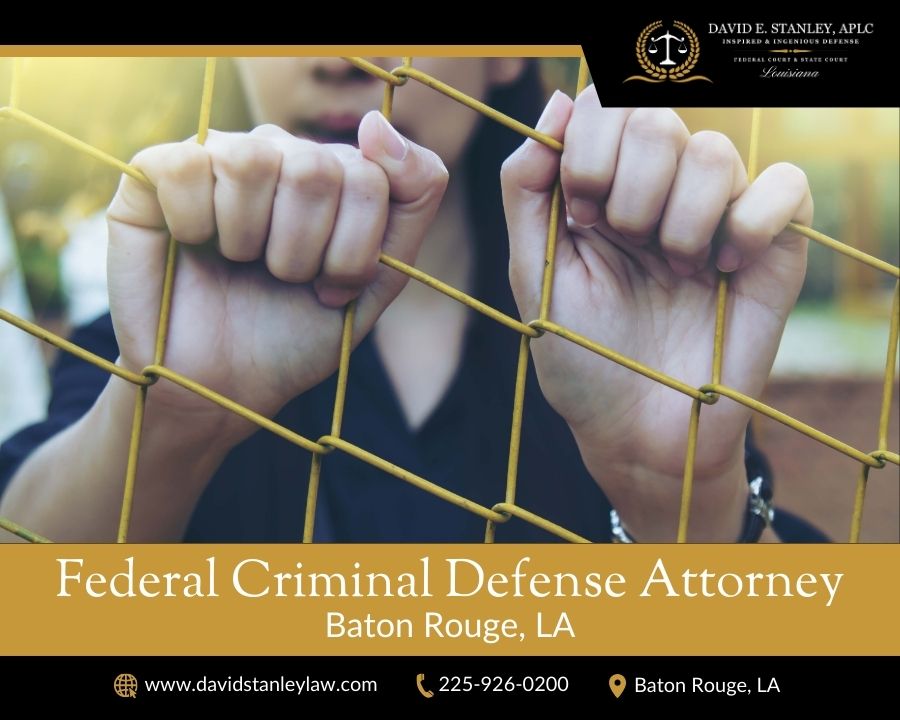
What Constitutes A Conspiracy Under Federal Law
Many indictments in federal court, particularly involving drug trafficking and distribution, will include a charge of conspiracy. Generally, a conspiracy is an agreement between two or more persons to engage in illegal activity. Sometimes, a conspiracy is complete when the parties reach an agreement. In other cases, the statute may require proof of one or more overt acts in furtherance of the conspiracy before the crime is complete.
The primary federal conspiracy statute is 18 U.S.C. § 371, which makes it unlawful for two or more persons to either conspire to defraud the United States or commit an offense against the United States. It requires proof of the commission of at least one overt act in furtherance of the conspiracy.
Conspiracy to defraud the United States means to seek to impede, impair, obstruct or interfere with a lawful function of the government, even if that interference is not itself a separate crime. Conspiracy to defraud includes not only monetary and property losses but also matters which affect the integrity of the federal government, its agencies, or programs by impairing, obstructing, or defeating their lawful functions.
Conspiracy to commit any offense against the United States occurs when two or more persons conspire to commit a federal crime. To convict a person of conspiracy to commit a crime, the government must prove that the conspirator voluntarily and intentionally made an agreement with another person to commit that crime, he had knowledge of the purpose of the agreement, and one of them knowingly committed an overt act in furtherance of their agreement. A formal agreement is not required. The agreement may be proven by evidence of concerted action under circumstances that indicate that all of the participants are working together with a common understanding and a single design to accomplish a common purpose.
The law treats each participant as an agent or partner of every other co-conspirator. Each participant is bound by, and responsible for, all of the actions and statements of all other co-conspirators made in furtherance of the conspiracy. A conspirator is liable for all foreseeable acts committed by his co-conspirators during the course of the conspiracy and in furtherance of it. This is referred to as Pinkerton liability. In addition, admissions and incriminating statements made by a conspirator during the course of the conspiracy are admissible at trial against all of the other co-conspirators. But, without an agreement on a joint purpose, there is no conspiracy regardless of their intent. Further, under the Sears rule, there is no agreement if a conspirator only conspires with another person who is actually a government agent because it takes two to conspire and there can be no viable conspiracy with a government informer who secretly intends to frustrate the conspiracy.
There are legitimate defenses to a conspiracy charge. Three common defenses include: (1) mere presence, (2) withdrawal from the conspiracy, and (3) an isolated buyer and seller. Mere presence or association with others, standing alone, does not support a conviction for conspiracy. Having some general knowledge of the existence of a conspiracy, wanting it to succeed, failing to notify law enforcement of the activities of the participants, or merely being present at the scene of the substantive crime may not support a conspiracy conviction.
The person raising the defense of withdrawal has the burden of proving his withdrawal from a conspiracy. A decision to stop committing overt acts in furtherance of the conspiracy is not a valid withdrawal. To withdraw, the conspirator must establish that he took affirmative actions intended to defeat or disavow the purpose of the conspiracy. He must prove that he took actions that were inconsistent with the object of the conspiracy and communicated his actions in a manner reasonably calculated to reach his co-conspirators.
In drug distribution cases, a conspiracy charge based solely on the fact that an isolated seller sold drugs to an isolated buyer is insufficient to establish a criminal conspiracy between the seller and the buyer. This is because overt acts, which by nature require at least two participants, do not, without more, constitute proof of the existence of a conspiracy between them. Federal Criminal Defense Attorney
What Is Money Laundering Under Federal Law
It is a federal crime to knowingly engage, or attempt to engage, in a monetary transaction in criminally derived property of more than $10,000 when it is derived from specified unlawful activity. Money laundering has three elements: (1) property valued at more than $10,000 that was derived from a specified unlawful activity, (2) the defendant engaged in a financial transaction with the property, and (3) the defendant had knowledge that the property was derived from unlawful activity. To establish the knowledge element of money laundering, the prosecution is required to prove that the defendant knew that the property involved is criminally derived. It does not require that the defendant have knowledge that the property was derived from specified unlawful activity. Criminally derived property means any property constituting, or derived from, proceeds obtained from a criminal offense.
However, under the clean-funds-out-first rule, if an account contains clean funds sufficient to cover the withdrawal at issue, then the government can not prove beyond a reasonable doubt that the withdrawal contained dirty money. But, when tainted money is commingled with untainted money in a bank account, the tainted money can no longer be distinguished from the untainted money. The courts have recognized that a problem arises when the defendant makes several withdrawals that are each individually for an amount that is less than the clean-funds in his commingled account. To deal with the problem of multiple withdrawals from commingled funds, the court uses an aggregation rule in which the transactions are aggregated together so that, when the total amount withdrawn from the account in all transactions exceeds the clean funds in the account, individual withdrawals will be found to be of tainted money, even when a particular withdrawal was less than the amount of clean money in the account. Consequently, using this aggregation rule, the government must only prove aggregate withdrawals of more than $10,000 above the amount of clean funds in the account to validate a money-laundering conviction. Federal Criminal Defense Attorney
What Is The Foreign Corrupt Practices Act.
In 1997, Congress passed the Foreign Corrupt Practices Act (FCPA) to combat the bribery of foreign officials by United States companies. See 15 U.S.C. §§ 78dd-1, 78dd-2, 78dd-3, 78m, and 78ff. The FCPA has anti-bribery provisions that prohibit persons and businesses in the United States, foreign public companies listed on United States exchanges, issuers required to file periodic reports with the SEC, and some foreign persons and businesses acting within the territorial jurisdiction of the United States from making corrupt payments to foreign officials to obtain or keep business. It also contains accounting provisions requiring issuers to make and keep accurate books and records. They must also devise and maintain an adequate system of internal accounting controls. Finally, these provisions prohibit issuers from knowingly falsifying books and records or knowingly circumventing or failing to implement a system of internal controls.
The United States Department of Justice has a Foreign Corrupt Practices Act unit that investigates possible FCPA crimes. A number of other law enforcement agencies are also actively involved in investigating FCPA violations including the Federal Bureau of Investigation, the Internal Revenue Service Criminal Investigation, the Department of Homeland Security, and the Department of Treasury’s Office of Foreign Assets Control. The Securities and Exchange Commission handles civil enforcement of the FCPA. The Division of Enforcement has responsibility for investigating and prosecuting civil enforcement actions for FCPA violations It takes enforcement actions against issuers and their officers, directors, employees, agents, or stockholders who are acting on the issuer’s behalf.
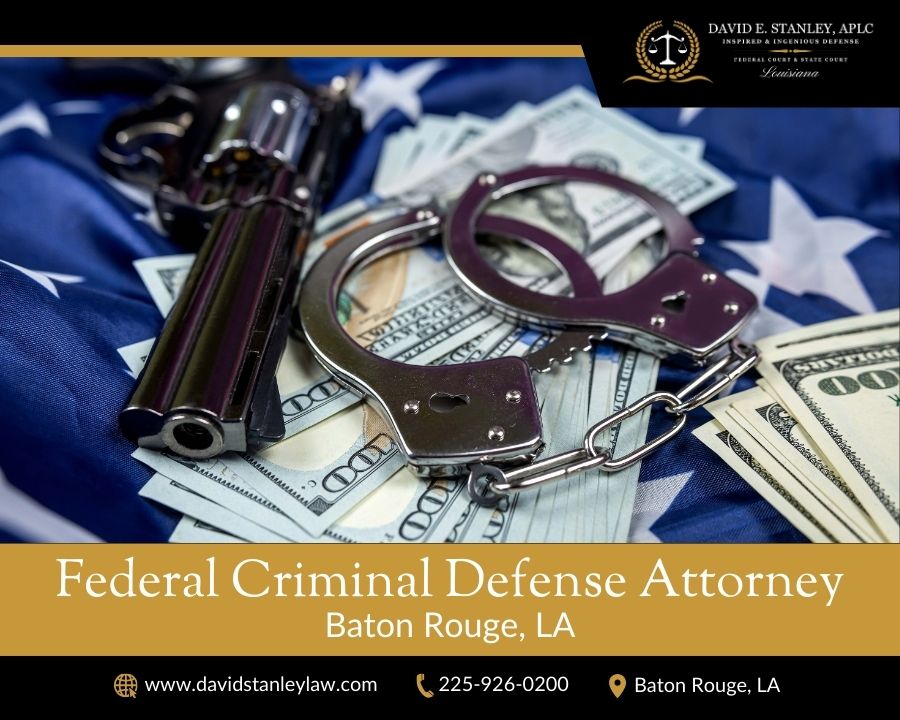
What Is The Statute of Limitations For Federal Crimes?
Unfortunately, the short answer is that it depends. Some federal crimes have no statute of limitations period. Thus, there is no time limit on an indictment for an offense that is punishable by death. There are over ninety federal crimes, involving the death of the victim, that authorize the imposition of the death penalty. Likewise, for crimes that Congress has associated with terrorism, and which result in death, serious injury, or create a foreseeable risk of death or serious injury, there is no time limit for an indictment. At last count, there were nearly fifty terrorism offenses. Finally, there is no statute of limitations period for approximately twenty federal child abduction and sex offenses.
Other federal offenses have statutes of limitation that range from one year to twenty years. Except as otherwise provided by law, the standard statute of limitations period within which to bring an indictment for most federal criminal offenses is five years from the date of the offense pursuant to the provisions of 18 U.S.C. § 3282(a). However, some offenses have a shorter or longer statute of limitations period. For example, there is a one year limitation period for criminal contempt while securities fraud cases have a six year statute of limitations period. Hate crimes that do not end in death have a seven year statute of limitations period.
Statutes of limitations are not typically jurisdictional in nature. The United States Supreme Court will only treat a statute of limitations time bar as jurisdictional if Congress has clearly stated that it is jurisdictional. Also, the statute of limitations defense can be expressly and explicitly waived by the defendant. Consequently, a waiver of the statute of limitations that is knowingly and intelligently made by the defendant will usually be valid and enforceable.
In federal criminal cases, the statute of limitations must be raised as an affirmative defense by a pretrial motion pursuant to Rule 12(b) of the Federal Rules of Criminal Procedure. The failure to assert the statute of limitations as a defense before trial will be considered by the court to be a waiver of the defense. Further, if the defendant enters into a guilty plea, without expressly and explicitly reserving the statute of limitations defense, he will be held to have waived the defense and will not be able to assert it on appeal. In other words, a defendant cannot raise the statute of limitations defense for the first time on appeal.
A common question, which sometimes may be difficult to answer, is when does the applicable limitations period begin to run. The general rule provides that the statute of limitations begins to run when the offense is completed. In conspiracy cases, the answer depends on whether the particular conspiracy statute requires, or does not require, the commission of an overt act in furtherance of the conspiracy. For conspiracy offenses that require an overt act, the limitations period begins once the last overt act is committed, or when the defendant withdraws from the conspiracy. However, for conspiracy offenses that do not require the commission of an overt act, the statute of limitations begins to run from the date of the accomplishment of the objectives of the conspiracy or from the date of its abandonment.
Finally, it is important to understand that the applicable statute of limitations period may be subject to suspension and tolling. For example, the government may suspend the statute of limitations for any fugitive or for cases involving DNA evidence. Thus, the statute of limitations does not run, and is tolled, during periods when the defendant is a fugitive. Plus, the defendant does not have to be physically absent from the jurisdiction of the court for this tolling provision to apply. Federal Criminal Defense Attorney
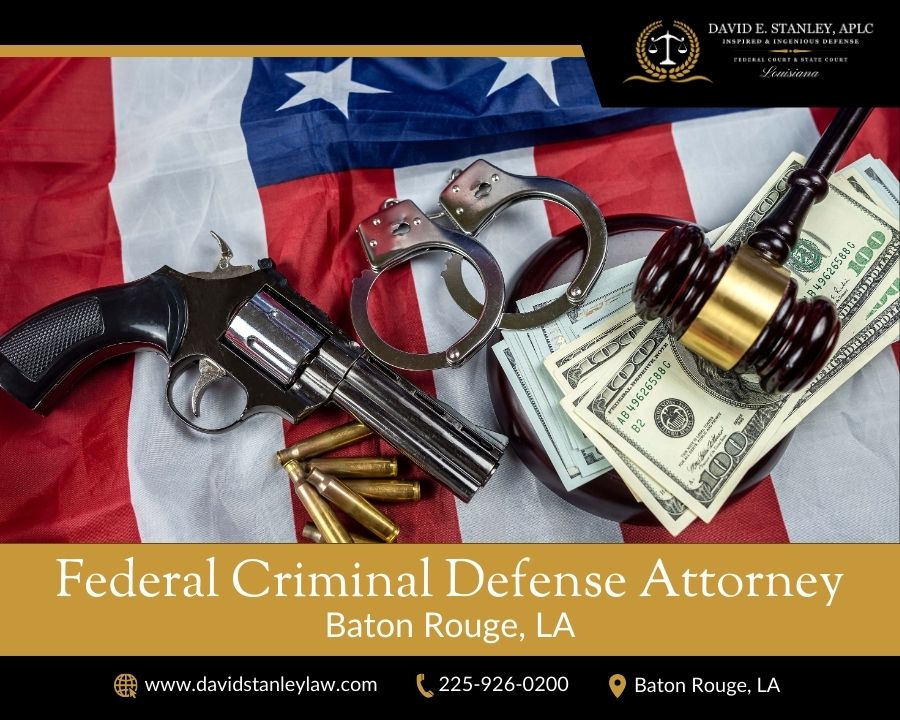
In Louisiana, If I Need To Appeal My Federal District Court Conviction, What Court Will Hear My Appeal.
If you entered a plea of guilty and expressly reserved your right to appeal one or more issues in your case, or if you were convicted at trial and sentenced in a federal district court in Louisiana, your case may be appealed to the United States Court of Appeals for the Fifth Circuit in New Orleans, Louisiana.
If you have decided to fight your federal criminal charges, and protect your good name, no matter what it takes or the cost of doing so, David Stanley is a distinguished and well respected criminal trial attorney experienced in defending felony criminal cases in the federal courts in Louisiana. Call David now to schedule your completely confidential and in-depth federal criminal defense strategy session. Use the time available to you wisely and efficiently to build a strong defense. Get started on your defense today. Federal Criminal Defense Attorney
Looking for A Criminal Defense Attorney? David Stanley, APLC is a seasoned and trusted federal criminal defense attorney who can help and guide you through your legal battle. We serve the following areas:
Criminal Defense Attorney Ascension Parish, LA
Criminal Defense Attorney Baker, LA
Criminal Defense Attorney Baton Rouge, LA
Criminal Defense Attorney Central City, LA
Criminal Defense Attorney East Baton Rouge Parish, LA
Criminal Defense Attorney East Feliciana Parish, LA
Criminal Defense Attorney Greenwell Springs, LA
Criminal Defense Attorney Iberville Parish, LA
Criminal Defense Attorney Lafayette Parish, LA
Criminal Defense Attorney Livingston Parish, LA
Criminal Defense Attorney Pointe Coupee Parish, LA
Criminal Defense Attorney Pride, LA
Criminal Defense Attorney St. Tammany Parish, LA
Criminal Defense Attorney Tangipahoa Parish, LA
Criminal Defense Attorney West Baton Rouge, LA
Criminal Defense Attorney West Feliciana Parish, LA
Criminal Defense Attorney Zachary, LA

